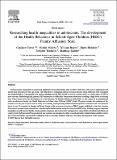Researching health inequalities in adolescents: The development of the Health Behaviour in School-Aged Children (HBSC) Family Affluence Scale.

View/
Date
2008Author
Molcho, Michal
Metadata
Show full item recordUsage
This item's downloads: 3218 (view details)
Recommended Citation
Currie, C., Molcho, M., Boyce, W., Holstein, B., Torsheim, T. & Richter, M. (2008). Researching health inequalities in adolescents: The development of the Health Behaviour in School-Aged Children (HBSC) Family Affluence Scale. Social Science & Medicine, 66(6), 1429-1436.
Published Version
Abstract
Socioeconomic inequalities in adolescent health have been little studied until recently, partly due to the lack of appropriate and agreed upon measures for this age group. The difficulties of measuring adolescent socioeconomic status (SES) are both conceptual and methodological. Conceptually, it is unclear whether parental SES should be used as a proxy, and if so, which aspect of SES is most relevant. Methodologically, parental SES information is difficult to obtain from adolescents resulting in high levels of missing data. These issues led to the development of a new measure, the Family Affluence Scale (FAS), in the context of an international study on adolescent health, the Health Behaviour in School-Aged Children (HBSC) Study. The paper reviews the evolution of the measure over the past 10 years and its utility in examining and explaining health related inequalities at national and cross-national levels in over 30 countries in Europe and North America. We present an overview of HBSC papers published to date that examine FAS-related socioeconomic inequalities in health and health behaviour, using data from the HBSC study. Findings suggest consistent inequalities in self-reported health, psychosomatic symptoms, physical activity and aspects of eating habits at both the individual and country level. FAS has recently been adopted, and in some cases adapted, by other research and policy related studies and this work is also reviewed. Finally, ongoing FAS validation work is described together with ideas for future development of the measure.
Collections
Except where otherwise noted, this item's license is described as Attribution-NonCommercial-NoDerivs 3.0 Ireland
Related items
Showing items related by title, author, creator and subject.
-
Developments in health literacy over time: A longitudinal qualitative research study
McKenna, Verna (NUI Galway, 2019-12-12)Introduction Conceptualising health literacy as a relational concept, which involves how individuals interact with complex health and social systems, requires a greater understanding of the context of people’s health ... -
Toward international collaboration on credentialing in health promotion and health education: The Galway Consensus Conference
Barry, Margaret M. (SAGE Journals Online, 2009-05)The interest in competencies, standards, and quality assurance in the professional preparation of public health professionals whose work involves health promotion and health education dates back several decades. In ... -
Toward international collaboration on credentialing in health promotion and health education: the galway consensus conference
Allegrante, John P.; Barry, Margaret M.; Auld, M. Elaine; Lamarre, Marie-Claude; Taub, Alyson (SAGE Publications, 2009-05-15)The interest in competencies, standards, and quality assurance in the professional preparation of public health professionals whose work involves health promotion and health education dates back several decades. In Australia, ...

